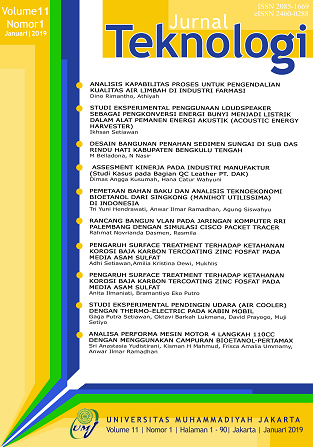ANALISIS KOMPONEN UTAMA FAKTOR-FAKTOR PENDAHULU (ANTECENDENTS) BERBAGI PENGETAHUAN PADA USAHA MIKRO, KECIL, DAN MENENGAH (UMKM) DI INDONESIA
Main Article Content
Abstract
Downloads
Article Details
COPYRIGHT POLICY
The author(s) of an article published in the Jurnal Teknologi retains ownership of the intellectual property rights in work (s).
PUBLISHING RIGHTS
The author(s) of an article published in the Jurnal Teknologi have unrestricted publication rights. The authors give the Jurnal Teknologi the right to publish the article and designate the Faculty of Engineering Universitas Muhammadiyah Jakarta Publishing as the original publisher of the article.
LICENSING POLICY
Journal of Mechanical Engineering and Sciences is an open-access journal that follows the Creative Commons Non-Commercial 4.0 International License (CC BY-NC 4.0), which states that:

Under this license, the reusers must give appropriate credit, provide a link to the license, and indicate if changes were made. Users may do so in any reasonable manner, but not in any way that suggests the licensor endorses users or their use.
Please take the time to read the whole license agreement (https://creativecommons.org/licenses/by-nc/4.0/). As long as reusers follow the license conditions, the owner cannot withdraw these freedoms. The following components are included under this license:
 Attribution: Users must provide appropriate attribution, including a link to the license, and indicate whether or not they made any modifications. Users are free to do so reasonably, but not in a manner that indicates the licensee approves of their usage.
Attribution: Users must provide appropriate attribution, including a link to the license, and indicate whether or not they made any modifications. Users are free to do so reasonably, but not in a manner that indicates the licensee approves of their usage.
 NonCommercial: Users may not use the material for commercial purposes.
NonCommercial: Users may not use the material for commercial purposes.
References
Al-Alawi, A.I., Al-Marzooqi, N.Y. dan Mohammed, Y.F. 2007. Organizational culture and knowledge sharing: critical success factors. Journal of Knowledge Management, 11(2), 22-42.
Bireswari, V.R. 2013. Organizational performance with employee attitude and behavior respect to IT industry, Bangalore-An empirical study. SSRN, 1-16.
Chang, W.J., Liao, S.H. dan Wu. T.T. 2017. Relationships among organizational culture, knowledge sharing, and innovation capability: a case of the automobile industry in Taiwan. Knowledge Management Research and Practice, 15(3), 471-490.
Chen, S.S., Chuang, Y.W., dan Chen, P.Y. 2012. Behavioral intention formation in knowledge sharing: Examining the roles of KMS quality, KMS self-efficacy, and organizational climate. Knowledge-Based System, 31, 1006-118.
Coakes, E. 2006. Storing and sharing knowledge: Supporting the management of knowledge made explicit in transnational organizations. The Learning Organization. 13, 579–593.
Departemen Koperasi & UKM RI. 2017. Sandingan Data UMKM 2012-2013. http://www.depkop.go.id/pdf-viewer/?p=uploads/tx_rtgfiles/sandingan_data_umkm_2012-2013.pdf (diakses pada 21 Maret 2018)
Fang, YH dan Chiu, CM. 2010. In justice we trust: Exploring knowledge-sharing continuance intentions in virtual communities of practice. Computers in Human Behavior, 26, 235–246.
Gazor, H., Koohkan, F., Kiarazm, A. dan Ameleh, K.N. 2012. Influential factors on knowledge sharing in banking industry. Management Science Letter, 2, 2215-2224.
Hidayat, R. 2017. Knowledge Conversion Untuk Standardisasi Proses Pengecapan Pada Batik Madura. Jurnal Teknologi, 9(1), 21-30.
Hong, D., Suh, E., & Koo, C. 2011. Developing strategies for overcoming barriers to knowledge sharing based on conversational knowledge management: A case study of a financial company. Expert Systems with Applications. 38, 14417–14427.
Huang, Q. Davison, R.M. dan Gu, J. 2011. The impact of trust, guanxi orientation and face on the intention of Chinese employees and managers to engage in peer-to peer tacit and explicit knowledge sharing. Information Systems Journal, 21, 557-577.
Jarvenpaa, S.L. & Staples, D.S. 2001. Exploring Perceptions of Organizational Ownership of Information and Expertise. Journal of Management Information Systems, 18(1), 151-183.
Kadar, M., Moise, I.A. dan Colomba, C. 2014. Innovation Management in the Globalized Digital Society. Procedia - Social and Behavioral Sciences,143, 1083–1089.
Kim, Hee-ju. 2008. Common Factor Analysis Versus Principal Component Analysis: Choice for Symptom Cluster Research. Asian Nursing Research March, 2(1), 17-24.
Kim, S., Lee H. 2004. Organizational Factors Affecting Knowledge Sharing Capabilities in E-government: An Empirical Study. In: Wimmer M.A. (eds) Knowledge Management in Electronic Government. KMGov 2004. Lecture Notes in Computer Science, vol 3035. Springer, Berlin, Heidelberg
Leydesdorff,L. 2010. The Knowledge-Based Economy and the Triple Helix Model. Annual Review of Information Science and Technology, 44,367-417.
Liao, Shu-Hsien, Wen-Jung Chang, Da-Chian Hu & Yi-Lan Yueh. 2012. Relationships Among Organizational Culture, Knowledge Acquisition, Organizational Learning, And Organizational Innovation In Taiwan's Banking And Insurance Industries. The International Journal of Human Resource Management, 23(1), 52-70.
Lin, W.B. 2008. The exploration factors of affecting knowledge sharing – The case of Taiwan’s high-tech industry. Expert Systems with Applications, 35, 661-676.
Putro, B.E. dan Ilmaniati, A. 2018. Developing Conceptual Model for The Effectiveness of Knowledge Sharing in Business Innovation for Indonesian MSMEs Performance, in Proceeding of International Conference on Digital Arts, Media and Technology 2018 (ICDAMT 2018).
Riege, Andreas. 2005. Three-dozen Knowledge-Sharing Barriers Managers Must Consider. Journal of Knowledge Management, 9(3), 18-35.
Ryan, R.M. dan Deci, E.L. 2000. Intrinsic and extrinsic motivations: Classic definitions and new directions. Contemporary educational psychology, 25, 54-67.
Wang, W.T. dan Wei, Z.H. 2011. Knowledge sharing in wiki communities: an empirical study. Online Information Review, 35(5), 799-820.
Wang, Z. dan Wang, N. 2012. Knowledge sharing, innovation and firm performance. Expert Systems with Applications, 39,8899-8908.
Yıldız, S., Baştürk, F., dan Boz, İ.T. 2014. The Effect of Leadership and Innovativeness on Business Performance. 10th International Strategic Management Conference. Procedia - Social and Behavioral Sciences,150, 785 – 793.
Yuen, T.J. dan Majid, M.S. 2007. Knowledge-sharing patterns of undergraduate students in Singapore. Library Review, 56(6), 485-495.
Zubair, M., Ahmad, N., dan Ahmed, R.R. (2014). Key Factors to Promote Knowledge Sharing in Karachi Pharmaceutical Industry. Information and Knowledge Management, 4(4), 125-138.

